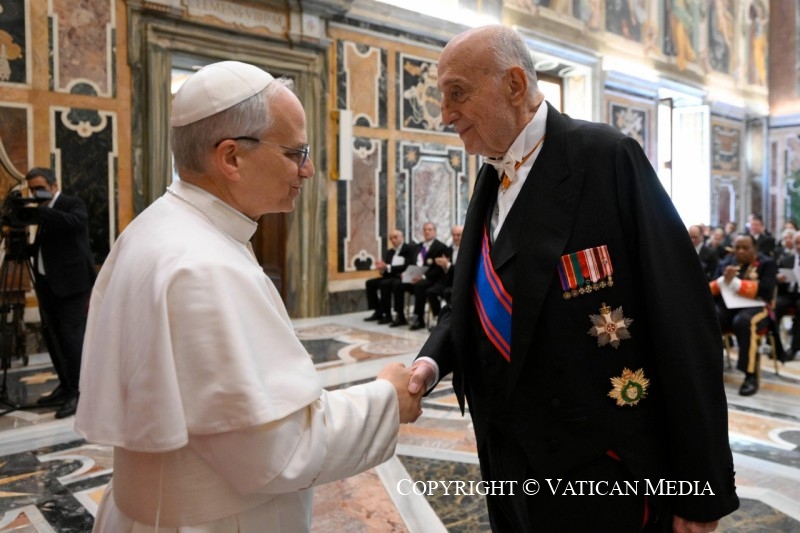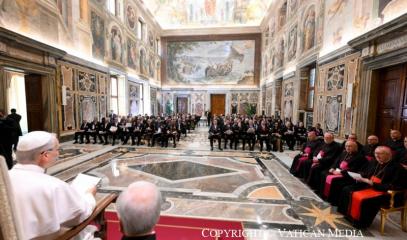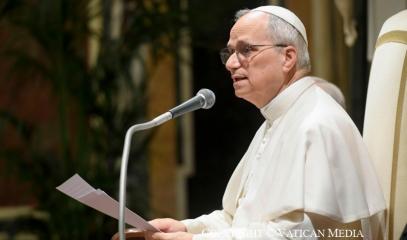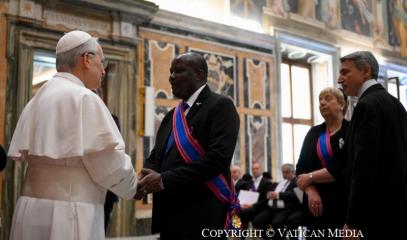Leo XIV tells ambassadors that ‘peace, justice and truth’ are needed for the world’s ‘family of peoples’
In his first address to the diplomatic corps accredited to the Holy See, the pontiff outlined the pillars of the Church's missionary action. In the Clementine Hall, he stressed the link between religious freedom and peace. “Give new life to multilateral diplomacy,” he said. He reiterated his opposition to weapons: “halt the production of instruments of destruction and death”. He cited today's challenges, like migration, the environment, and artificial intelligence. Cardinal Parolin notes that the Vatican is ready to facilitate meetings between Ukrainians and Russians.
Vatican City (AsiaNews) - Peace, justice and truth are, for Pope Leo XIV, “the pillars of the Church’s missionary activity and the aim of the Holy See’s diplomacy.”
The pontiff utter these words this morning in the Clementine Hall of the Vatican Apostolic Palace during a meeting with the diplomatic corps accredited to the Holy See.
“In our dialogue, I would like us always to preserve the sense of being a family. Indeed, the diplomatic community represents the entire family of peoples,” said the new pope at the beginning of his address.
Before starting, Leo thanked Georges Poulides, ambassador of Cyprus and dean of the diplomatic corps to the Vatican, who delivered the opening address of the audience, saying that the diplomatic corps stands “together with the Pope in the challenges of modernity.”
Addressing the ambassadors, Pope Leo XIV said: “My ministry begins in the heart of a Jubilee year, dedicated in a particular way to hope.” The Holy Year is a time of "conversion" and "renewal", an opportunity to leave "conflicts" in the past and "embark on a new path".
The way proposed by the new pope is to work "together" to "build a world in which everyone can lead an authentically human life in truth, justice and peace.” This is especially important for the places that “suffer most grievously,” such as “Ukraine and the Holy Land”.
The presence of diplomatic representatives “is a gift for me. It allows me to renew the Church’s aspiration — and my own — to reach out and embrace all individuals and peoples on the Earth, who need and yearn for truth, justice and peace!”
Pope Leo XIV cited his own experience as a priest, bishop and cardinal, in North America, South America and Europe, “marked by this aspiration to transcend borders in order to encounter different peoples and cultures.”
“Through the constant and patient work of the Secretariat of State, I intend to strengthen understanding and dialogue with you and with your countries,” he said.
Speaking then of the first "pillar" of the missionary Church and diplomacy - peace - he said: “All too often we consider it a ‘negative’ word, indicative only of the absence of war and conflict, since opposition is a perennial part of human nature”.
“Peace then appears simply as a respite, a pause between one dispute and another” since “tensions will always be present”. Yet, for Leo, “From a Christian perspective – but also in other religious traditions – peace is first and foremost a gift.” It “is built in the heart and from the heart, by eliminating pride and vindictiveness and carefully choosing our words.”
To make this real, the contribution of religions and, therefore, of interfaith dialogue is fundamental. “This naturally requires full respect for religious freedom in every country, since religious experience is an essential dimension of the human person. Without it, it is difficult, if not impossible, to bring about the purification of the heart necessary for building peaceful relationships.”
Therefore, “there is a need to give new life to multilateral diplomacy and to those international institutions conceived and designed primarily to remedy eventual disputes within the international community.”
Turning to the second "pillar”, justice, the Holy Father noted that “Working for peace requires acting justly.” Indeed, speaking about the papal name he chose, he mentioned Pope Leo XIII, author of the social encyclical Rerum Novarum, and today’s “epochal change”.
“Every effort should be made to overcome the global inequalities – between opulence and destitution – that are carving deep divides between continents, countries and even within individual societies.”
“It is the responsibility of government leaders to work to build harmonious and peaceful civil societies. This can be achieved above all by investing in the family, founded upon the stable union between a man and a woman”.
Turning again to his personal story “of a citizen, the descendant of immigrants, who in turn chose to emigrate,” he noted that in any situation, we “can find ourselves healthy or sick, employed or unemployed, living in our native land or in a foreign country, yet our dignity always remains unchanged: it is the dignity of a creature willed and loved by God.”
On truth, the third pillar, he said that without it, “Truly peaceful relationships cannot be built, also within the international community, apart from truth.” He stressed the importance of choosing words carefully. “Where words take on ambiguous and ambivalent connotations, and the virtual world, with its altered perception of reality, takes over unchecked, it is difficult to build authentic relationships”.
In light of this, “the Church can never be exempted from speaking the truth about humanity and the world, resorting whenever necessary to blunt language”, but it must always be joined to "charity". If this is done, “Truth, then, does not create division, but rather enables us to confront all the more resolutely the challenges of our time, such as migration, the ethical use of artificial intelligence and the protection of our beloved planet Earth.”
For the new pontiff, these are some of the challenges that require "the commitment and cooperation on the part of all".
Speaking on the sidelines of an event at the Gregorian University titled "Toward a Theology of Hope for and from Ukraine", organised under the patronage of the Ukrainian Greek-Catholic Church, Card Secretary of State Pietro Parolin spoke about the ongoing attempts in Istanbul to restart the peace process between Russia and Ukraine.
“We remain ready to offer spaces as well,” he said. “Talking about mediation might be excessive, but at the least we are willing to offer good offices to facilitate meetings.” At the same time, the Vatican does not want “to interfere with other ongoing initiatives.”
10/06/2025 17:14
08/01/2024 17:10
25/02/2022 16:12
02/09/2023 19:57










.png)










